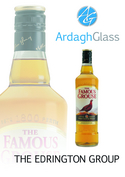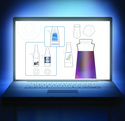Higher standards give standout
27 April 2010Standardisation is helping Ardagh to achieve consistent service and technical precision at all its 20 sites in seven European countries. Joanne Hunter reports.
One of Europe’s largest glass packaging manufacturers, Ardagh Group, is passing on to customers a host of benefits derived from its embedded culture of continuous improvement.
Through a structured approach to best practice and significant investment in new technologies, says Ardagh, it is successfully raising levels of service consistency and technical precision offered by some 6,500 people employed at 20 sites across seven European countries.
“The progress we are making through our ongoing standardisation programmes has enabled us to achieve best in class status in key areas, and consolidated our relationship with many key customers,” explains Johan Gorter, Ardagh’s managing director of European operations.
Modern glass manufacturing boasts excellent environmental credentials due to high levels of recycled content in the production of new containers. In addition, Ardagh is recognised as a pioneer in lightweighting and making further advances by rolling out new design software, analytical systems and inspection technology.
“Partnerships with customers in key areas such as lightweighting are a key driver for our business,” says sales and marketing director Reiner Brand. “These projects mean working more closely together and adopting a cross-functional approach, which taps into all areas of our expertise.”
Ardagh was recently awarded ‘Supplier of the Year’ by international whisky firm The Edrington Group. Its supply chain director, David Donaldson, comments: “Ardagh manufactures a very complex product that performs consistently on our lines. Their overall account management is excellent, they clearly take our vendor rating process seriously, helping to drive their business forward. They provide an excellent sales and technical response to our enquiries and queries, and their internal and external communications are first class.”
Ardagh expanded into seven countries when it acquired Rexam Glass in 2007. In addition to a wealth of technical and practical knowledge, it found among the plants many different cultures and ways of working, The OEG (Operational Excellence Group) was created to harness all that expertise and develop a coherent ‘best practice’ programme.
“Through the OEG, we are far more focused on quality risk management and customer needs. We are moving towards a standardised approach that provides us with the fastest know-how transfer so that quality can be reproduced throughout the company,” adds Mr Gorter.
A newly centralised technical service function of the organisation has provided a focused and consistent level of technical support across the group.
Significant progress is now being made in furnace colour change activities and furnace rebuilds, reducing operating downtime and improving quality.
On best practice in the design area, Carsten Berkau, Ardagh’s group product and mould design manager, says: “The introduction in 2010 of a standard 3D CAD system using ‘Pro Engineer’ software will bring greater efficiency and accuracy in the design process. Also, thanks to advanced embossing design software ‘Freeform’, designers can achieve ‘more precise and effective’ results.
“A state of the art FEA stress analysis tool enables critical parameters of the design to be checked prior to production, which is invaluable given the increasing complexity of the containers we now produce, and the demands placed upon them by modern high speed filling lines. This technology has been used extensively to support our lightweighting programme.” Desktop Rapid Prototyping is another technique that Ardagh has helped to pioneer. “By creating a 3D model capturing critical parts of the container, our customers can view within 24 hours a prototype of the container with the embossing, knowing that the end result will be identical,” explains Mr Berkau.
Best practice is being effective in the vital areas of quality checks, critical defect reduction and inspection equipment. John Parkes, group quality director, comments on the impact of shifting the emphasis of inspection from the cold to the hot end of the glass production process. “This enables us to address any quality issues much earlier in the manufacturing process which is bringing real advances in quality consistency,” he says.
Lighter wine by design
Italian wine producer Cielo e Terra is bottling its popular Freschello and Cielo table wines in lightweight Lean+Green glass packaging from O-I. Keeping the distinctive characteristics of the Bordeaux shape, L+G bottles weigh only 345g and use more than 90% recycled glass content.
Narrow neck press and blow (NNPB) technology enable the manufacture of the long-neck glass bottle shapes at up to 33% lighter than standard bottles. A Lean+Green version of the Schlegel bottle, used for German Mosel wines weighs 360g instead of the previous 440g. The SchlegelL+G is produced by O-I in The Netherlands in green and flint glass, with plans for an amber bottle in the near future. Energy use is said to be 10% lower. The recycled glass percentage is about 75-80% for the green bottle and, due to limited availability, 30-40% for the flint glass version.
Despite subtle design changes, the height and diameter of the bottle remain the same. “This means that the bottlers do not have to make changes to their production lines, so no extra investment is needed,” explains Benoît Villaret, O-I Europe’s marketing manager for wine.
How low can you go?
The wine supply chain has free access to a design for a ‘groundbreaking’ 300g wine bottle thanks to a new online resource from the Government backed Waste & Resources Action Programme. The screwcap bottle is 40g lighter than the previous lightest bottle available in the UK. Developed by a WRAP-led group including Tesco, Quinn Glass and Kingsland Wine & Spirits, it weighs 188g less than the average wine bottle.
Raw material, manufacturing and transport costs are reduced without affecting bottle strength, and CO2 emissions are ‘significantly’ lower, it is claimed. A high percentage (71%) of recycled content, closing the recycling loop and creating a market for the UK’s large surplus of green glass, are among its advantages. Tesco has ordered 10 million bottles and Asda, The Co-operative and Sainsbury’s have expressed interest.
Keep it in the family
UK manufacturer Beatson Clark is market testing new design concepts.
“We commissioned Blue Marlin to research current product offerings, analyse the latest market trends and devise innovative designs,” says marketing manager Dawn Pugh. The concept names portray the look and flow of each container’s individual structure: Flame, Ribbon, Jewel, Aqua, Flux and Rubic.
This ‘family’ concept can be used for a variety of different products within a brand.
Ardagh was awarded ‘Supplier of the Year’ by whisky firm The Edrington Group. Ardagh O-I Lean+Green Schlegel bottle for German Mosel wines. O-I Concept designs by Beatson Clark. Beatson Clark




